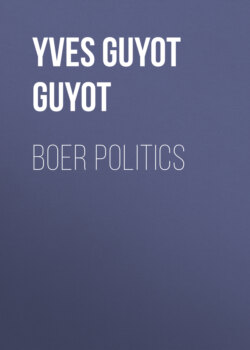Читать книгу Boer Politics - Yves Guyot Guyot - Страница 15
На сайте Литреса книга снята с продажи.
2.—The English in South Africa.
ОглавлениеDr. Kuyper cannot forgive the English their occupation of the Cape. Yet, they had only followed the example of the Dutch who, during their war with Spain, 1568–1648, had seized the greater portion of the Portuguese colonies, because Portugal had been an ally of Spain. Holland had been forced into an alliance with France, and in exactly the same way, in 1794 and 1806, England seized the Cape. In 1814 she bought it from the Prince of Orange. Dr. Kuyper does not deny that the price was paid, but remarks that it did not replenish the coffers of the prince. Be that as it may, the treaty is none the less valid, and the "Petition of Rights" begins by protesting against "the action of the King of Holland who, in 1814, had ceded Cape Colony to England in exchange for Belgium." The English valued the newly acquired colony only as a naval station; they did not endeavour to extend the territory they occupied. Professor Bryce clearly shows in his "Impressions of South Africa" that if England had enlarged her possessions it had been in despite of herself, and solely to ensure their safety; although, from the treatise "Great Britain and the Dutch Republics," published in The Times, and reproduced in Le Siècle, it is evident that she had always considered that her rights in South Africa extended to the frontier of the Portuguese possessions; that is to say, to the 25° of latitude, in which latitude Delagoa Bay is situated.
Dr. Kuyper begins by himself putting us somewhat on our guard concerning his feelings towards England; for, not only does he decline to forgive her the occupation of Cape Colony, but also her triumph over Holland in the eighteenth century.
"Nowhere had resentment against 'perfide Albion' penetrated national feeling more deeply than in the Netherlands. Between the Dutch and English characters there is absolute incompatibility."
As a rule, I attach little faith to such generalities; in this case, I am sure, rightly. Forgetting his dictum of "absolute incompatibility" (p. 449), Dr. Kuyper, at p. 520, shows that, as far as he is concerned, it is only relative; for in speaking of England, he goes on to say:—
"Were I not a Dutchman, I should prefer to be one of her sons. Her habitual veracity is above suspicion; the sense of duty and justice is innate in her. Her constitutional institutions are universally imitated. Nowhere else do we find the sense of self-respect more largely developed."
Dr. Kuyper further admits that the "incompatibility" is relative as far as Afrikanders are concerned, it is only "absolute" as applied to the Boers. After giving us this example of the consistency of his views, Dr. Kuyper speaks of the English as being "unobservant." A reproach somewhat unexpected, when directed against the countrymen of Darwin. As a proof, he presents us with this metaphor, equally unexpected from the pen of a Dutchman—a dweller of the plains:—
"Because, in winter, the English had only seen in these insignificant river beds a harmless thread of frozen water, they took no thought of the formidable torrent which the thawing of the snow, in spring, would send rushing down to inundate their banks."
"The torrent" is of course the war now going on. Lord Roberts seems to be successfully coping with the "inundation."
